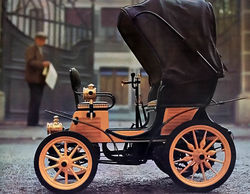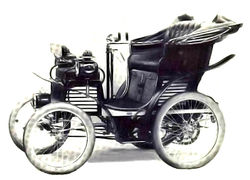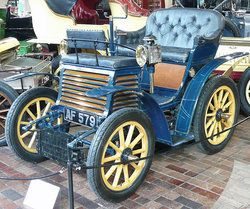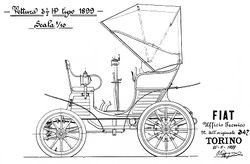Difference between revisions of "Fiat 4 HP"
m |
m |
||
| (7 intermediate revisions by the same user not shown) | |||
| Line 2: | Line 2: | ||
{| border=1 cellspacing=3 cellpadding=4 style="float:right; margin:0 0 .5em 1em; width:250px; background:#505050; border-collapse:collapse; border:1px solid #999; font-size:83%; line-height:1.5; " summary="Infobox Automobile" | {| border=1 cellspacing=3 cellpadding=4 style="float:right; margin:0 0 .5em 1em; width:250px; background:#505050; border-collapse:collapse; border:1px solid #999; font-size:83%; line-height:1.5; " summary="Infobox Automobile" | ||
|- style="text-align:center; background:#505050;" | |- style="text-align:center; background:#505050;" | ||
| − | | colspan=2 style="padding:0; background:#333333; color:#fff; border-bottom:1px solid #999;" |[[Image:Fiat 3,5hp 1899.jpg|250px|Fiat | + | | colspan=2 style="padding:0; background:#333333; color:#fff; border-bottom:1px solid #999;" |[[Image:Fiat 3½HP (1899).jpg|250px|Fiat 3.5 hp (1899)]] |
| + | |- style="color:#fff; background:darkred; font-size:larger;" | ||
| + | ! colspan=2 |'''Fiat 3.5 HP''' | ||
| + | |- | ||
| + | | colspan=2 style="padding:0; background:#333333; color:#fff; border-bottom:1px solid #999;" |[[Image:Fiat 3,5hp 1899.jpg|250px|Fiat 4 hp (1899)]] | ||
|- style="color:#fff; background:darkred; font-size:larger;" | |- style="color:#fff; background:darkred; font-size:larger;" | ||
! colspan=2 |'''Fiat 4 HP''' | ! colspan=2 |'''Fiat 4 HP''' | ||
| Line 51: | Line 55: | ||
| − | == Background and | + | == Background and Genesis of the Project == |
| − | Towards the end of | + | |
| − | + | Towards the end of the nineteenth century, an automotive excitement was spreading in [[Europe]] which also reached [[Italy]]. In the early 1890s, in fact, the engineer [[Enrico Bernardi]] from [[Verona]] created and a small gasoline tricycle, which is regarded as the first Italian car, whose production was initiated by [[Miari Giusti|Miari & Giusti]] in [[1894]]. | |
| − | + | ||
| + | [[File:Fiat 3½HP (1899_schema).jpg|thumb|250px|left|'''1899 Fiat 3½HP (schema)''']] | ||
| + | |||
| + | On the 11th of July, 1899, a dozen of aristocrats who shared a passion for motor racing, established [[Fiat]] by the end of that year in [[Turin]] and began the production of the 3 ½ HP. | ||
| + | |||
| + | This first model is derived from ''Welleyes Ing.'', a car designed by [[Aristide Faccioli]], handmade by "[[Ceirano GB & C]]" and acquired by nascent F.I.A.T.. | ||
| − | |||
== Technical Data == | == Technical Data == | ||
| − | [[File: 1899 FIAT.JPG|thumb|left|The 3 ½ HP at the [[National Motor Museum]], in Great Britain]] | + | [[File: 1899 FIAT.JPG|thumb|left|250px|'''The 3 ½ HP at the [[National Motor Museum]], in Great Britain''']] |
The engine, situated to the rear, is a twin [[liquid cooling|water cooled]] through a heater coil, the [[cubic]] to 657 [[cubic centimeter|cm³]] for an effective power of about 4 ½ HP (nominal power was shown in 3 ½ HP for tax purposes) only 400 rpm, which allows a maximum speed of 35 km/h. | The engine, situated to the rear, is a twin [[liquid cooling|water cooled]] through a heater coil, the [[cubic]] to 657 [[cubic centimeter|cm³]] for an effective power of about 4 ½ HP (nominal power was shown in 3 ½ HP for tax purposes) only 400 rpm, which allows a maximum speed of 35 km/h. | ||
| Line 66: | Line 74: | ||
Despite being a four-seater, the Typo vis-à-vis, was a very compact car with a wheelbase of 1470 mm and a 1200 mm wide axel. Fuel consumption was 8 liters of per 100 km. | Despite being a four-seater, the Typo vis-à-vis, was a very compact car with a wheelbase of 1470 mm and a 1200 mm wide axel. Fuel consumption was 8 liters of per 100 km. | ||
| + | |||
| + | |||
| Line 71: | Line 81: | ||
For the first eight units built in 1899, they added another 18 the following year, with a total of 26 specimens. Four units are know to have survived: one is preserved at Fiat at the''Centro Storico'' museum, [[Museum of Carlo Biscaretti Ruffia]]'' in [[Turin]], one in the [[Ford Museum]] in the [[United States]] and the fourth at the [[National Motor Museum]] in the [[United Kingdom]]. | For the first eight units built in 1899, they added another 18 the following year, with a total of 26 specimens. Four units are know to have survived: one is preserved at Fiat at the''Centro Storico'' museum, [[Museum of Carlo Biscaretti Ruffia]]'' in [[Turin]], one in the [[Ford Museum]] in the [[United States]] and the fourth at the [[National Motor Museum]] in the [[United Kingdom]]. | ||
| − | |||
| − | |||
| − | |||
| − | |||
| − | |||
Latest revision as of 23:23, 2 November 2011

| |
| Fiat 3.5 HP | |
|---|---|

| |
| Fiat 4 HP | |
| Aka | FIAT 3 ½ HP Fiat 3.5 CV |
| Manufacturer | Fiat |
| Production | 1899-1900 |
| Class | |
| Assembly | |
| Layout | RR layout |
| Body_style | vis à vis |
| Engine | straight-2 679 cc |
| Transmission | 3-speed manual |
| Length | 2300mm |
| Width | 1420mm |
| Height | 1450mm |
| Weight | 680kg |
| Wheelbase | 1470mm |
| Predecessor | |
| Successor | Fiat 6 HP |
| Related | |
| Designer | Aristide Faccioli |
The FIAT 4 HP, sometimes called the 3 ½ CV, was the first model of car produced by FIAT. Eight examples were produced in its first year (1899) and total of 24 between 1899 and 1900. The car had a water cooled 0.7-liter (679 cc) 2-cylinder, rear-mounted engine producing 4.2 horsepower at 800 rpm, mounted to a three-speed gearbox. (No reverse gear was included.) With this tiny engine the car could achieve top speed of 35km/h. Despite having such a small engine, the car used fuel 8L/100 km.
This first Fiat was based on work of Ceirano GB & C (car producer) called Ceirano Welleyes. The 3 ½ had coachwork by Marcello Alessio from Turin. Couple of the First Fiats have survived; one is in Automobile Museum of Turin, and the other one in the Ford Museum in Dearborn, Michigan in the USA.
The 'Fiat 3 ½ HP sometimes also called 'Fiat 4 HP, was the first model of vehicle built by the then nascent Italian factory in Turin Fiat.
Background and Genesis of the Project
Towards the end of the nineteenth century, an automotive excitement was spreading in Europe which also reached Italy. In the early 1890s, in fact, the engineer Enrico Bernardi from Verona created and a small gasoline tricycle, which is regarded as the first Italian car, whose production was initiated by Miari & Giusti in 1894.
On the 11th of July, 1899, a dozen of aristocrats who shared a passion for motor racing, established Fiat by the end of that year in Turin and began the production of the 3 ½ HP.
This first model is derived from Welleyes Ing., a car designed by Aristide Faccioli, handmade by "Ceirano GB & C" and acquired by nascent F.I.A.T..
Technical Data

The engine, situated to the rear, is a twin water cooled through a heater coil, the cubic to 657 cm³ for an effective power of about 4 ½ HP (nominal power was shown in 3 ½ HP for tax purposes) only 400 rpm, which allows a maximum speed of 35 km/h.
The gearbox had three gears and no reverse gear with freewheel device, the clutch cone and a chain driven Transmission. Dual brake system, placed at the rear: the foot that acts on the one hand on the drive shafts and wheels. The latter are made of wood, fitted with tires 580x55 front and 670x55 rear.
Despite being a four-seater, the Typo vis-à-vis, was a very compact car with a wheelbase of 1470 mm and a 1200 mm wide axel. Fuel consumption was 8 liters of per 100 km.
Production
For the first eight units built in 1899, they added another 18 the following year, with a total of 26 specimens. Four units are know to have survived: one is preserved at Fiat at theCentro Storico museum, Museum of Carlo Biscaretti Ruffia in Turin, one in the Ford Museum in the United States and the fourth at the National Motor Museum in the United Kingdom.
| Fiat car timeline, European market, 1899s-1949s Next -> | ||||||||||||||||||||||||||||||||||||||||||||||||||||
|---|---|---|---|---|---|---|---|---|---|---|---|---|---|---|---|---|---|---|---|---|---|---|---|---|---|---|---|---|---|---|---|---|---|---|---|---|---|---|---|---|---|---|---|---|---|---|---|---|---|---|---|---|
| Type | 1890s | 1900s | 1910s | 1920s | 1930s | 1940s | ||||||||||||||||||||||||||||||||||||||||||||||
| 8 | 9 | 0 | 1 | 2 | 3 | 4 | 5 | 6 | 7 | 8 | 9 | 0 | 1 | 2 | 3 | 4 | 5 | 6 | 7 | 8 | 9 | 0 | 1 | 2 | 3 | 4 | 5 | 6 | 7 | 8 | 9 | 0 | 1 | 2 | 3 | 4 | 5 | 6 | 7 | 8 | 9 | 0 | 1 | 2 | 3 | 4 | 5 | 6 | 7 | 8 | 9 | |
| City car | 3,5 HP | 500 A / 500 B (Topolino) ... | ||||||||||||||||||||||||||||||||||||||||||||||||||
| Small family car | 6 HP 8 HP 10 HP |
509 / 509 S | 508 (Ballila) | Ballila 1100 A / B ... | ||||||||||||||||||||||||||||||||||||||||||||||||
| Family car | 1 | 1A / Zero | 70 | 501 / 501 S / 502 / 503 | 514 / 515 | 1500 | ||||||||||||||||||||||||||||||||||||||||||||||
| Large family car | Brevetti | 2 | 2B | 505 | 507 | 518 | ||||||||||||||||||||||||||||||||||||||||||||||
| 12 HP / 16-20 HP / 16-24 HP | 15-25 HP Brevetti | 520 / 521 | 522 / 524 | 527 | 2800 | |||||||||||||||||||||||||||||||||||||||||||||||
| Executive car | 20-30 HP | 3 | 3A / 3Ter | 510 | 512 | 525 / 525 S | ||||||||||||||||||||||||||||||||||||||||||||||
| 24-32 HP / 60 HP | 28-40 HP / 30-45 HP / 50 HP | 4 / 5 / 6 | 520 "Superfiat" | 519 / 519 S | ||||||||||||||||||||||||||||||||||||||||||||||||
| Race car | ||||||||||||||||||||||||||||||||||||||||||||||||||||
| 130 HP Corsa | ||||||||||||||||||||||||||||||||||||||||||||||||||||
